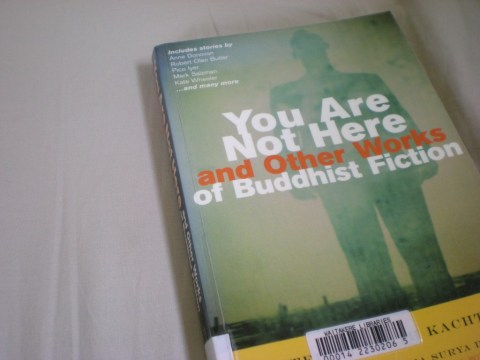[SS] You Are Not Here and Other Works of Buddhist Fiction – Keith Kachtick (ed.)
April 3, 2010 § 8 Comments

When I picked this book from the library, I was intrigued by the latter part of the title (the part referring to Buddhist Fiction). I’ll be the first to admit that I’m really not quite sure about when religion is used to categorise fiction, like how do I know if something is Christian fiction, or if it’s just a work of fiction featuring a rather religious character? I’m just never too sure. And this title caught my attention, because for me, it’s even more difficult to tell what Buddhist fiction might be like, because Buddhism seems to me to be a rather subdued, quiet sort of belief. And I was curious to see if Buddhist fiction would reflect that same quietness, almost zen-like quality.
Usually when I read a collection of short stories, I look at the contents page, pick out a couple of stories which titles catch my imagination, and start with those. Failing that, I read them in sequence. In the instance of this book, none of the titles seemed to jump out at me, and so I was quite content to just start reading from the first story onwards.
It’s a little sad, though, that I’ve only managed to read the first few stories in this collection of 20, even though I’ve already been at it for a month or so now. I had thought I would like Buddha Da by Anne Donovan, which I think is an extract from her full-length novel. It’s written completely in dialect, and though it was a little confusing at times, reading it out loud helped quite a bit. I’m not sure I got the point of extracting that bit of the story when a man attended Buddhist camp, but there’s quite a good review of the novel at Farm Lane Books.
The one that I liked the best of – I don’t know, maybe 6? – stories that I’ve read would be Samantha Schoech’s The Good People of Lake George. It tells the story of a married woman who’s having an affair (a relationship, almost, considering they were together for 6 years or so) with her father’s friend, who is also married, and whose wife is also quite close to her. Celeste, her father, and a few other of his friends spend time together during weekends in a retreat of some sort by Lake George, and during one such weekend, Celeste is seriously thinking about finally breaking things off with the man.
There is this conversation that takes place, which I think encapsulates the essence of the story quite well. (Robin is the man’s wife).
In the front seat, Robin exhales through her nose and throws up her hands. “Affairs happen all the time. They are as much a part of life as marriage. People do get hurt – you’re right. But there’s no point in getting all prissy about it.”
“I’m not talking about getting prissy.” Celeste’s voices is stronger now. “I’m just trying to figure out how you are supposed to love someone. How are you supposed to be good if nothing is bad?”
“Your problem is vocabulary,” her father says. “Good and bad are not particularly helpful words.”
*
In the end, I’m still not convinced about how one defines something as “Buddhist fiction”. If all it takes is that the main character is a Buddhist, or if the story is mainly set in a Buddhist temple, then really, it all just feels rather superficial.
Maybe it’s just me. I can be a stickler for these kinds of things. Sometimes I just don’t quite like the many boxes that we tend to create, the many pigeonholes that we make up just so everything fits in perfectly into one category or another. Or maybe it’s a gimmick, something that shouts out, “Hey, I’m different!” I just don’t know.

I can’t imagine reading an extract from Buddha Da. I do recommend reading the novel though. I find the concept of Buddhist fiction (or any other religion) a bit of a turn-off, but I enjoyed Buddha Da, so perhaps I shouldn’t be so quick to avoid it in future.
Reading the extract actually did put me off a bit, because I was initially quite interested in reading Buddha Da. Now I’m not too sure.
I think a story is Christian (or Buddhist or whatever) when it encapsulates the values of that particular religion. I don’t think it necessarily has to be overt – but then, I prefer a more subtle approach, I don’t like being beaten over the head with a Bible.
Therefore, I think I would say that many stories are Christian even when the author had no intention of them being so, simply because the author has incorporated his/her values.
Thanks for the comment Janice. I can see what you mean. And I can definitely appreciate what you’re saying. But somehow I’m still a little reluctant to define stories as Christian/Buddhist/religion or otherwise.
But I don’t stay away from stories that define themselves as such. Sometimes I’m actually even quite pulled into reading books like this because I’m curious. =)
You constantly surprise me with your reads!
Haha. Thanks aloi. I think? =)
I agree that some of the categories we make for books are difficult to understand. I always feel the same about “romance” — is it a romance if people fall in love during the story? Georgette Heyer’s books are on the romance shelves but they aren’t any heavier on the love than a Jane Austen book. Why is Austen literature and Heyer is romance? And neither are racy or sexual.
Exactly! I’m actually no good with genres at all. I don’t know how the books are lumped into either one pile or the other. Some are quite obvious, but some are just a little random.